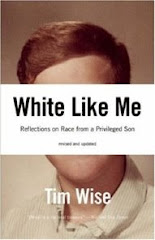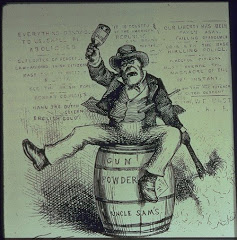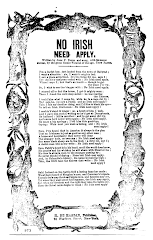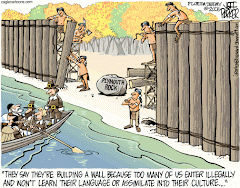3.16.2009
God gave the Irish whiskey so that they wouldn't take over the world (3)
3.12.2009
color commentary plus q & q (life notes #3)
qualitative quotations:
"[American invaders are] the horde of banditti, of drunkards, of fornicators...vandals vomited from hell, monsters who bid defiance to the laws of nature...shameless, daring, ignorant, ragged, bad-smelling, long-bearded men with hats turned up at the brim, thirsty with the desire to appropriate our riches and our beautiful damsels" (Takaki, 175).
[The reason I selected this quote was because I feel like we often do not hear from those are oppressed and the atrocities & injustice that they experience. For once, they have a voice. This author seems to have had it with the severe maltreatment that has been happening between both communities.]
"Don't condemn me for leaving my country, poverty and necessity are at fault. Good-bye, pretty Guanajuato the state in which I was born. I'm going to the United States far away from you...Good-bye, my beloved country, now I am going away....I go to the United States to seek to earn a living. Good-bye, my beloved land; I bear you in my heart" (Takaki, 317).
[This quote reveals what it was like, emotionally, for the people of Mexico to leave their homeland. Takaki does a fairly good job of describing this diaspora; however, I cannot imagine how painful it must have been to leave just about everything behind--including family.]
"The white people won't do the work and they won't live as the Mexicans do on beans and tortillas and in one room shacks. Whites cannot be as easily domineered, led, or directed as the Mexicans. I prefer Mexican labor to other classes of labor. It is more humble and you get more for your money. No other class we could bring to Texas could take his place. He's a natural farm laborer" (Takaki, 321).
[I don't know what to make of this quote, but it is rather disturbing. The author is speaking as if the Mexican people ENJOY their accommodations and on-site treatment. It almost sounds as if the white author believes that he is doing the Mexican people a favor by ]
"There would be a revolution in the community if the Mexicans wanted to come to the white schools. Sentiment is bitterly against it. It is based on racial inferiority. Let him [the Mexican] have as good an education but still let him know he is not as good as a white man. God did not intend him to be; He would have made them white if He had. Why don't we let the Mexicans come to the white school? Because a damned greaser is not fit to sit side of a white girl" (Takaki, 327).
[Similar to the quotation below, I chose this one because it highlighted the "racial inferiority" that had invaded the local & national school systems as well as one white man's religious understanding between himself and a Mexican man. I have never heard the term "greaser" before, but I would imagine that it is highly offensive.]
"Educating the Mexicans is educating them away from the job, away from the dirt. You have doubtless heard that ignorance is bliss; it seems that is so when one has to transplant onions...So you see it is up to the white population to keep the Mexican on his knees in an onion patch or in new ground. This does not mix very well with education" (Spring, 95).
[This quote illustrates the self-serving attitudes of the white community members to restrict the Mexican people from acquiring an education of some sort and continue to exploit their strong agricultural skills. The white community members believe it is their duty to create this educational & labor division. These words also appears in Takaki's A Different Mirror.]
critical questions:
question #1: Both Joel Spring and Ronald Takaki have noted that the characteristics and work ethic of the Mexican people were contributing factors to the efficient labor that was completed in mid-to-late 19th century America. If this is accurate, then I would like to know why the Mexican people were so willing to labor for individuals who had the utmost disrespect for them and their culture? Was it simply due to the fact that US landowners offered significantly higher wages or was it more than financial security?
question #2: My girlfriend was born and raised in Lima, Peru. She came to the US after her father (who lost his private business in Lima) moved and established himself in the Pacific Southwest. She attended UNLV for one year and then transferred to Loyola Marymount in LA a few years later. I met her through a well-known service organization, known as the Jesuit Volunteer Corps, and we have been together ever since. What are the chances that this relationship would have ever been born had the two of us been living anytime before the 1950s? Why is that?
question #3: Throughout the assigned readings, there are multiple instances when the Mexican people speak out against members of the black community. These interactions remind me of the ones that the Irish had with the black community in the early to mid 1800s. My question then is why do the Mexican (and Irish) people turn against and curse the black laborers & community members, when they are experiencing the same emotions and turmoil as their counterparts? Are these actions easier and much less threatening than empathizing with another racial/ethnic group?














